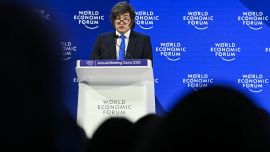Argentina’s ruling class may have many virtues, but they do not include the ability to manage the economy with a modicum of competence. With few exceptions, its leading lights take it for granted that they inhabit a country which is several times richer than the one the rest of us live in and use the money that comes their way accordingly. With the acquiescence of much of the population, professional politicians, judges and others rake in enough to allow them to enjoy a standard of living comparable to that of their counterparts in far richer countries, even if they do not supplement their incomes by accepting juicy bribes from businessmen or gangsters, as far too many do.
Unless this changes, inflation will continue to rage. It is the natural result of a generalised reluctance to live within the means available. To distract attention from the many privileges they have accumulated, politicians of all kinds make out they are doing their utmost to help common folk win back what is theirs by right but which has been taken away by, if they are on one side of the divide, “capitalism” “neoliberalism,” “imperialism” and rapacious foreigners or, if they are on the other, “Peronist populism” in all its many varieties.
This is what they are doing right now. For a couple of years, it looked as though the latter had the upper hand, but since yet another run on the peso put paid to “gradualism,” the former – who are far better at getting their views across than their antagonists – have been making a comeback. Whether or not they will succeed in unseating Mauricio Macri and bring things back to what for them is normal is an open question. Either way, Argentina seems likely to remain hooked on inflation for years to come, an outlook that will not worry overmuch the many politicians who are far more interested in their own wellbeing than in that of their tens of millions of compatriots who, despite everything, are still willing to give them their support.
It is thanks to this political establishment that inflation has long been as Argentine as a prime barbequed beef steak. On occasion, other countries such as Germany, Greece and Hungary in first half of the last century and, lately, Venezuela, have seen prices rise at an even faster rate, but after a while they got things under control and vowed to keep them that way. Here, they have kept going up and up for over 70 years. The only time they stayed put for a time was when, back in the 1990s, Domingo Cavallo outsourced monetary policy to the Federal Reserve by nailing the national currency to the US dollar. Unfortunately for all of us, he couldn’t outsource much else. Local politicians and businessmen took full advantage of the monetary stability he contrived to borrow huge amounts of money and then spend it in the usual fashion.
Not surprisingly, it all ended in tears when the entire economy came crashing down to earth, burying millions of people in the wreckage. Did the country’s leading politicians learn anything from that disaster? Apparently not. After a brief period in the doghouse, they emerged and set about convincing much of the population that from then on they would handle the economy in a sensible manner.
Their efforts to shift the blame for what had happened proved successful: apart from a few prominent politicians, among them Cavallo and Fernando de la Rúa, who served as scapegoats, most of the people who had a hand in ruining the country kept their jobs and, what is just as dispiriting, as the years passed the younger men and women who began replacing them turned out to be much like their predecessors.
Many of them, including senior Radical members of the Cambiemos (Let’s Change) coalition and even PRO stalwarts such as Buenos Aires ProvinceGovernor Maria Eugenia Vidal and Buenos Aires City Mayor Horacio Rodríguez Larreta, are hard at work badgering Macri to help them stay in office by increasing public spending.
They know that would give inflation an extra shove, but can point out that were they, and Macri, to lose the elections which are looming over the horizon, the economic consequences could be catastrophic because the mere prospect of the country acquiring yet another Peronist government has already made the dreaded markets give Argentina the thumbs down with the JP Morgan country risk index topping 850 points. Should one actually take office, they would, for all intents and purposes, pronounce the country stone dead. Few think a new Peronist president, even Mrs Cristina Fernández de Kirchner, could turn out to be a fiscal hawk because otherwise Argentina would follow Venezuela down the plughole, but perhaps it would be unwise to underestimate the chameleon-like capacity of Juan Domingo Perón’s heirs to adapt to new circumstances, as indeed did Carlos Menem when the country, driven mad by inflation, seemed on the verge of falling over a cliff.
In most parts of the world, governments react to symptoms of inflation that here would escape notice by doing whatever it takes, no matter how unpopular the measures they adopt may be, because they understand that should the disease take hold, it would cause an immense amount of damage. Argentine governments prefer a wait-and-see approach; time and time again, they have kept their fingers crossed in the hope that somehow or other the beast would go away.
By and large, this is what Macri has done. When he began his presidential stint, he and the people surrounding him assumed that his many foes would make the country explode were he to tackle inflation head on, hence the “gradualism” that characterised his first two years and four months in the Casa Rosada, but now he realises that, while the unrest encouraged by constantly rising prices may be less dramatic than the riots he initially feared, it is eating away at his rapidly diminishing political capital when he most needs to keep it intact.
Will the government’s attempt to slow inflation with price agreements and manipulating the exchange rate buy Macri more time?
It could, but that would not mean inflation was at long last beating
a retreat. If experience is anything to go by, the moment the controls
are lifted, it would come roaring back determined to make up for
lost time, as it has done so often in the past.related news



















Comments